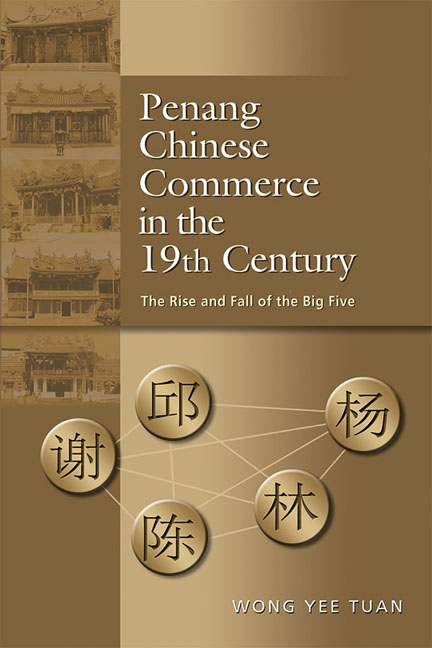Book contents
- Frontmatter
- Dedication
- Contents
- List of Tables, Diagrams and Maps
- Acknowledgements
- Glossary
- Abbreviations and Acronyms
- Notes on Spelling and Names
- Notes on Currencies
- Map
- 1 Introduction
- 2 Penang and the Big Five in Regional Context
- 3 Kith and Kin: The Big Five Familial Web
- 4 Opium Farm Rivalry
- 5 The Contest for ‘White Gold’
- 6 Western Mercantile Elite and Their Challenge to the Penang Chinese
- 7 New Regional Order and the Decline of the Big Five
- 8 Conclusion
- Appendices
- Bibliography
- Index
- About the Author
- Platesection
- Map
- Frontmatter
- Dedication
- Contents
- List of Tables, Diagrams and Maps
- Acknowledgements
- Glossary
- Abbreviations and Acronyms
- Notes on Spelling and Names
- Notes on Currencies
- Map
- 1 Introduction
- 2 Penang and the Big Five in Regional Context
- 3 Kith and Kin: The Big Five Familial Web
- 4 Opium Farm Rivalry
- 5 The Contest for ‘White Gold’
- 6 Western Mercantile Elite and Their Challenge to the Penang Chinese
- 7 New Regional Order and the Decline of the Big Five
- 8 Conclusion
- Appendices
- Bibliography
- Index
- About the Author
- Platesection
- Map
Summary
The Big Five Hokkien business families of the nineteenth century controlled the most crucial economic elements of the age and the region, namely labour, capital, organizations, and business networks. The family alliances and power relationships that they formed in and around Penang crucially and profoundly shaped the development of the region. Hence, they serve well as a point of access to recover the vibrant socioeconomic and political life at local and regional levels, to contextualize the subtle interaction between the business elite, the grass roots, and the colonial and indigenous political powers, and to reconstruct the local state and wider regional history. My work serves not only as a complement to the scarce literature on the Hokkien business families and their business networks, but also another trajectory to use the Hokkien business families as a tool of analysis for the study of Southeast Asian economic history in the nineteenth century. This is in contrast to some previous studies which tended to take a Euro-centric approach. It has led us to believe that Western interests played the leading role, while this study on the Big Five tries to deconstruct the conventional narratives and restore the long-neglected local agency and show a more nuanced picture of the Southeast Asian communities, societies and histories in the nineteenth century, where the Hokkien business elite families played such a central role.
My work has also shown that the economic importance of the local Chinese merchants and their crucial business networks in transforming Penang into not just a trading port, but also a financial and business centre from which numerous enterprises were launched and controlled. This development helped to consolidate the business leadership of the Hokkien elite families during the colonial period of rapid economic expansion. A detailed analysis of the Big Five's business operations, family relationships, inter-huiconflicts, economic cooperation and competition has led us to see a wide-ranging web of hybrid and fluid regional business networks that contributed to the Big Five's economic ascendancy and fashioned the contours and patterns of Penang and its surrounding states (southern Burma, southwestern Siam, western Malay states, and the north and eastern coasts of Sumatra) as a single economic unit in the nineteenth century.
Despite the rise of Singapore, Penang, being a maritime base of the Big Five, remained as a regional entrepot.
- Type
- Chapter
- Information
- Penang Chinese Commerce in the 19th CenturyThe Rise and Fall of the Big Five, pp. 170 - 176Publisher: ISEAS–Yusof Ishak InstitutePrint publication year: 2015



